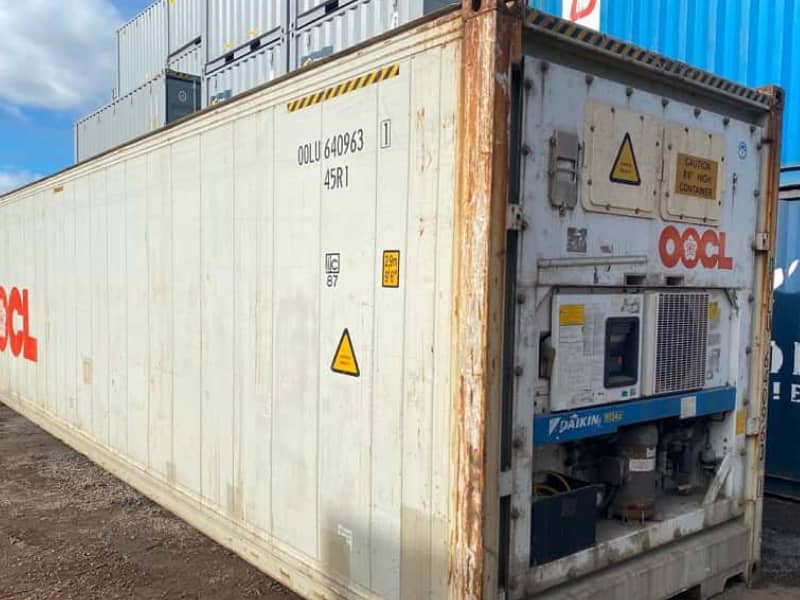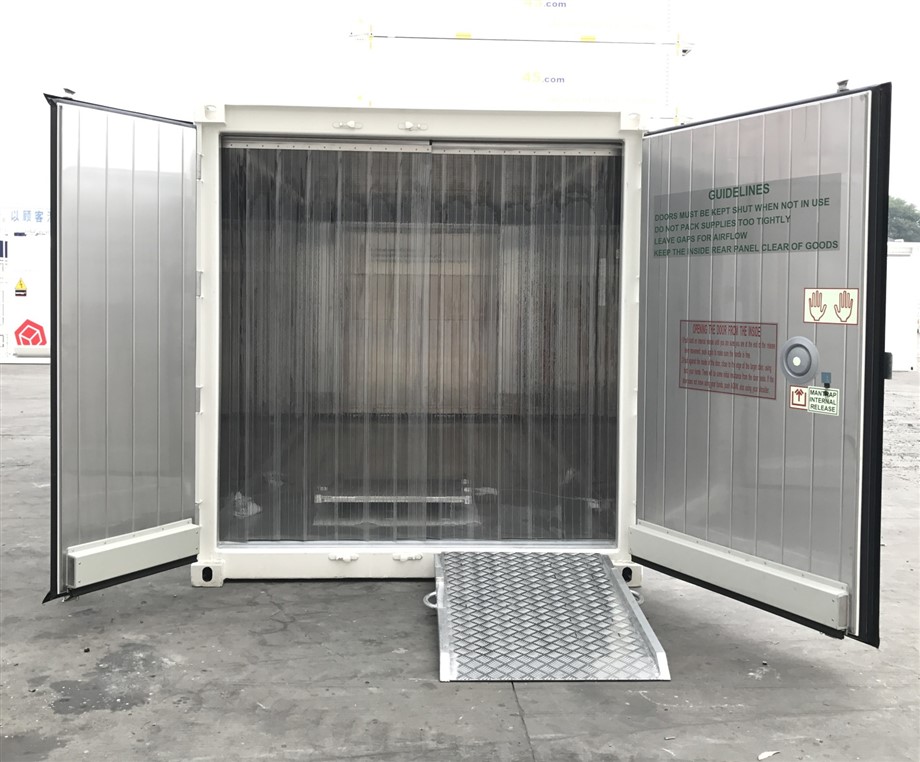Everything About Cold Store Containers: Necessary Insights for Your Storage Needs
Cold store containers play an essential role in the conservation of subject to spoiling products. They can be found in numerous types, including cooled and protected units, each made for certain storage needs. Recognizing the benefits and vital functions of these containers is important for businesses intending to enhance their procedures. As the demand for reliable storage space solutions expands, exploring the different options readily available can result in educated decisions that affect both success and sustainability. What factors should one think about when picking the best container?
Types of Freezer Containers
Freezer containers been available in numerous types, each developed to satisfy details temperature control requirements. Amongst one of the most usual kinds are refrigerated containers, which preserve temperatures between 0 ° C to 10 ° C, making them appropriate for subject to spoiling goods like fruits, vegetables, and dairy products. Another type is the deep freezer container, which runs at temperature levels listed below -18 ° C, suitable for lasting storage space of icy things such as meats and fish and shellfish.
Shielded containers offer temperature stability without active cooling, making them valuable for short-term transportation of temperature-sensitive products. Furthermore, there are portable cold store devices, which provide flexibility in places and are frequently made use of in occasions or seasonal procedures. Lastly, blast refrigerators quickly lower the temperature level of warm foods, making sure safety and security and top quality. Each kind offers a distinct purpose in numerous markets, from food service to pharmaceuticals, emphasizing the relevance of picking the best container for particular storage needs.

Benefits of Making Use Of Freezer Solutions

Chilly storage space options prolong the shelf life of products, decreasing waste and increasing productivity for services. By efficiently taking care of stock with correct temperature control, companies can maximize their supply chains and enhance functional efficiency.
In addition, chilly storage space centers permit adaptable storage alternatives, fitting numerous volume requirements and seasonal changes sought after (used 40ft refrigerated shipping containers). This flexibility assists businesses react swiftly to market changes
Utilizing cool storage space remedies can assure compliance with wellness and security regulations, guarding both organizations and customers. Overall, the calculated usage of cold store improves item monitoring while advertising sustainability and economic stability.
Key Functions to Try To Find in Freezer Containers
When picking cold storage containers, a number of crucial functions benefit cautious factor to consider to safeguard peak efficiency and integrity. Temperature control abilities are crucial; containers should maintain consistent temperatures ideal for particular products. Insulation high quality also plays a significant role, as superior insulation reduces power intake and improves temperature stability.
Next, simplicity of access and loading is crucial; containers ought to provide easy to use designs for reliable handling and company. Toughness is an additional vital element; weather-resistant materials assure durability and protect contents versus ecological factors.
In addition, wheelchair functions, such as built-in wheels or raising points, promote transportation, while customizable formats enable tailored storage solutions.
Finally, keeping track of systems, including temperature level alarms and remote monitoring, offer real-time updates, ensuring that conditions continue to be suitable. By focusing on these attributes, users can pick cold store containers that meet their functional needs successfully.
Selecting the Right Freezer Container for Your Needs
Picking the right cold store container needs a thoughtful assessment of certain needs and operational demands. Variables such as the type of items being saved, temperature level sensitivity, and volume needs to be prioritized. Subject to spoiling food things might necessitate containers with strict temperature controls, while drugs might need exact conditions to maintain efficacy.
Furthermore, prospective customers should think about the container's size and wheelchair. A bigger device might be required for mass storage space, while smaller sized, portable options could be optimal for short-lived or on-site demands. Insulation quality and energy efficiency are also critical, as these will impact operational costs and temperature level security.
Conformity with market regulations and standards is essential, particularly in sectors like food and medical care. By meticulously reviewing these aspects, individuals can select a cool storage container that efficiently fulfills their one-of-a-kind demands and guarantees optimum storage conditions.
Ideal Practices for Keeping Freezer Issues
Preserving optimal cold store problems is important for preserving the high quality and safety of temperature-sensitive items. Regularly checking temperature and moisture levels is critical; making use of reputable electronic thermometers and hygrometers can provide precise readings. Appropriate insulation of cool storage space containers assists minimize temperature variations and power loss.
Executing a first-in, first-out (FIFO) system ensures that older supply is made use of before newer supply, decreasing waste (used 40ft refrigerated shipping containers). In addition, preserving an organized format within the storage space permits far better air movement and minimizes the threat of cross-contamination
Routine maintenance examine tools, such as seals and compressors, are essential to avoid breakdowns. Team training on finest practices for packing and discharging items aids keep temperature honesty. Maintaining doors closed as much as possible limitations heat exchange, assuring that the cold storage atmosphere stays efficient and stable in maintaining valuable items.
Price Factors To Consider for Cold Store Solutions
When examining cold storage space options, it is important to consider the first investment expenses along with ongoing operational expenses. A detailed malfunction of these costs can expose substantial lasting financial savings potential for Read More Here companies. Understanding these economic elements aids stakeholders make educated choices regarding their freezer demands.

Preliminary Investment Prices
The financial landscape of cold store containers presents various preliminary investment prices that organizations have to consider. These expenses generally include the purchase or rental rate of the containers, which can differ based upon kind, insulation, and size top quality. Additionally, expenses connected to retrofitting existing frameworks to accommodate cold store has to be factored in, particularly if specialized equipment is called for. Setup expenses, consisting of electrical work and refrigeration systems, likewise add to the overall preliminary financial investment. Businesses must not overlook transport costs for delivering containers to their wanted location. Finally, possible customization choices, such as shelving or temperature level surveillance systems, can even more influence the initial financial expense. Cautious budgeting for these variables is crucial for successful freezer execution.
Functional Costs Failure
Operational expenditures for freezer services incorporate several essential price factors to consider that companies need to navigate. Secret variables consist of energy costs, which can be substantial because of the demand to keep low temperatures. Maintenance expenses are likewise substantial, as routine servicing is necessary to ensure tools runs effectively and stays certified with wellness and security requirements. Additionally, labor costs might arise from the requirement for specialized personnel to handle and keep an eye on the hop over to here storage space atmosphere. Insurance coverage expenses are another consideration, as business need to secure their financial investments against possible losses. Any type of potential regulative compliance costs must be factored in, as services may require to invest in systems that adhere to food safety and environmental policies. Recognizing these costs is vital for efficient budgeting.
Long-Term Cost Savings Prospective
Spending in cold storage space services uses substantial long-term cost savings capacity, transforming initial expenses into economic effectiveness with time. By reducing wasting and waste, companies can boost their profit margins significantly. Advanced insulation and energy-efficient systems reduce energy prices, which build up over the life expectancy of the devices. Chilly storage space containers typically require much less frequent upkeep compared to typical refrigeration techniques, leading to reduced repair service costs. The capacity to store items for extended durations without compromising top quality allows organizations to maximize market variations, enhancing income. Furthermore, the scalability of freezer remedies enables business to adjust to changing needs without sustaining excessive expenses. On the whole, these factors add to site an engaging case for chilly storage space as an affordable investment approach.
Often Asked Inquiries
How Much Time Can Food Be Saved in Freezer Containers?
The period food can be saved in cold storage containers differs by kind. Generally, disposable things last from days to weeks, while icy foods can remain risk-free for months, depending upon correct temperature and storage conditions.
Are Cold Store Containers Energy-Efficient?
The energy efficiency of freezer containers differs based upon layout and insulation quality. Modern units commonly use sophisticated technology to lessen energy consumption, eventually adding to lowered functional costs and environmental influence in long-lasting use.
Can Cold Store Containers Be Personalized for Specific Needs?
Freezer containers can undoubtedly be customized to meet specific demands. Alterations might consist of temperature level controls, dimension modifications, and extra functions, enabling users to customize remedies properly for various storage requirements and functional choices.
What Are the Typical Sizes of Cold Store Containers?
Freezer containers generally come in basic dimensions such as 10, 20, and 40 feet. These dimensions accommodate numerous storage space demands, making sure flexibility for companies needing temperature-controlled settings for subject to spoiling products or delicate materials.
Do Cold Store Containers Require Unique Permits for Use?
Cold storage space containers commonly need unique licenses for usage, depending upon local guidelines and intended applications. Authorities might mandate licenses to ensure safety criteria, environmental conformity, and proper functional practices are kept during their application.
Cold storage space containers come in various kinds, each made to meet details temperature control requirements. Additionally, cold storage space facilities enable for adaptable storage choices, fitting different quantity needs and seasonal changes in need. Selecting the best cold storage container calls for a thoughtful analysis of functional needs and certain requirements. The monetary landscape of cold storage containers provides numerous initial investment prices that services should think about. Cold storage space containers can indeed be personalized to fulfill certain demands.